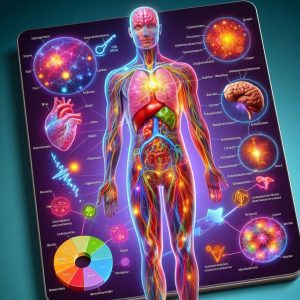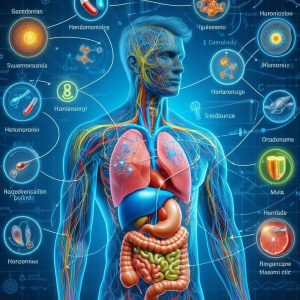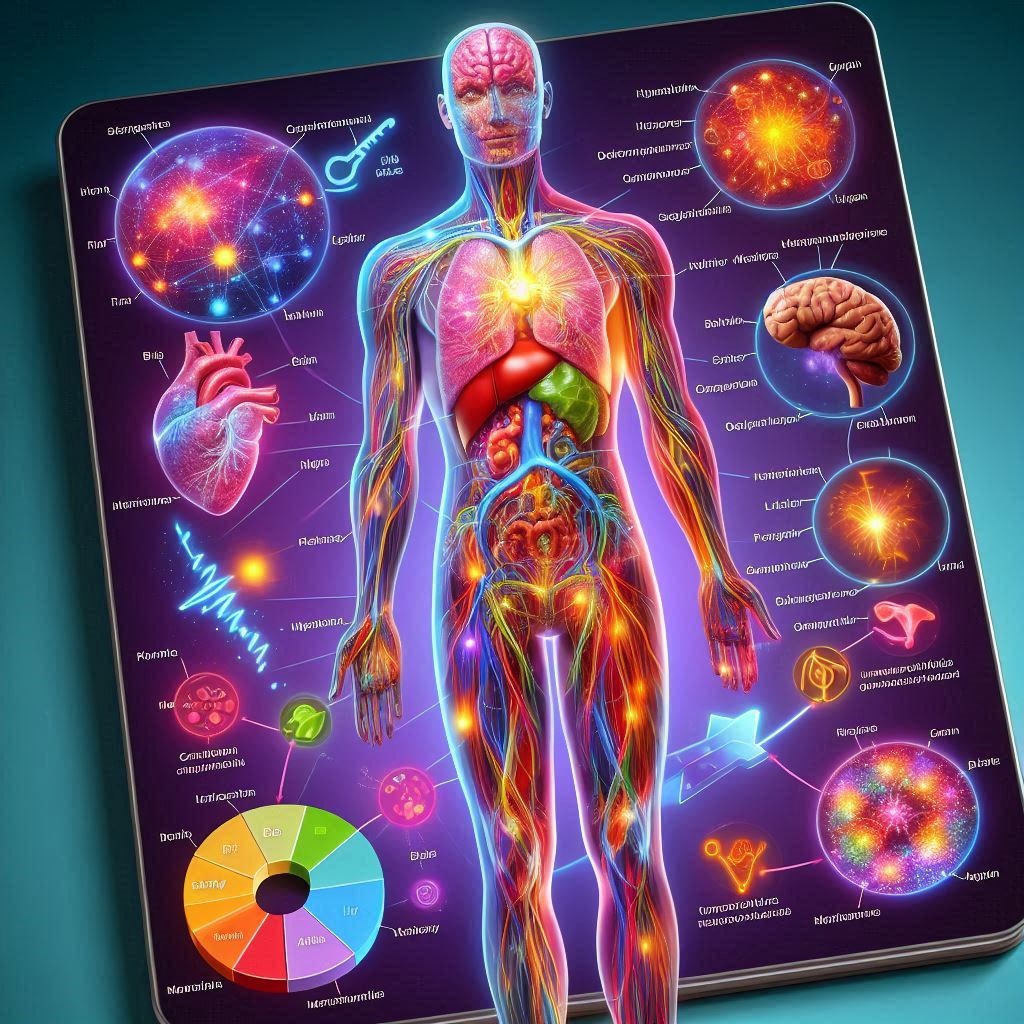Introduction to Metabolism and Hormones
Metabolism refers to the chemical processes that occur within a living organism to maintain life. These processes include the conversion of food to energy, the elimination of waste products, and the synthesis of necessary compounds. Hormones are crucial in regulating metabolism and ensuring the body functions properly. For a detailed overview of metabolism, visit the Khan Academy.
The Role of Hormones in Metabolism
Hormones are integral to regulating metabolic processes within the body. They act as chemical messengers, transmitting signals to various organs and tissues to coordinate energy production, growth, and homeostasis functions. The endocrine system, which includes glands like the thyroid, pancreas, and adrenal glands, produces these hormones. For an in-depth understanding of the endocrine system, visit the Hormone Health Network.
Here are some of the key hormones involved in metabolism:
- Insulin: Produced by the pancreas, insulin regulates blood glucose levels by facilitating glucose uptake into cells. It is essential for maintaining energy balance. For more details on insulin, check out the American Diabetes Association.
- Glucagon: Also produced by the pancreas, glucagon works opposite to insulin by increasing blood glucose levels through the breakdown of glycogen stored in the liver. Learn more about glucagon at the NCBI Bookshelf.
- Thyroid Hormones (T3 and T4): These hormones regulate the metabolic rate, influencing how quickly the body uses energy. They also play roles in growth and development. For further information, visit the American Thyroid Association.
- Cortisol: Known as the stress hormone, cortisol is produced by the adrenal glands and increases blood glucose levels while also having anti-inflammatory effects. More details can be found at the Endocrine Society.
- Adrenaline: Another hormone from the adrenal glands, adrenaline prepares the body for ‘fight-or-flight’ responses by increasing heart rate, muscle strength, and blood pressure. For more about adrenaline, check out Medical News Today.
These hormones work together to ensure that the body’s metabolism operates efficiently. They help regulate energy balance, control blood glucose levels, and respond to stress, among other critical functions. Imbalances in these hormones can lead to metabolic disorders, underscoring the importance of understanding their roles. For comprehensive information on metabolic hormones, visit the Hormone Health Network.
Key Metabolic Hormones
| Hormone | Function | Source |
|---|---|---|
| Insulin | Regulates blood glucose levels by promoting the uptake of glucose into cells. | Pancreas |
| Glucagon | Raises blood glucose levels by stimulating the conversion of glycogen to glucose in the liver. | Pancreas |
| Thyroid Hormones (T3 and T4) | Regulate metabolic rate, growth, and development. | Thyroid Gland |
| Cortisol | Increases blood glucose levels and has anti-inflammatory effects. | Adrenal Glands |
| Adrenaline | Increases heart rate, muscle strength, and blood pressure in response to stress. | Adrenal Glands |

Key Metabolic Hormones
Hormones play crucial roles in regulating metabolism, ensuring that the body maintains energy balance and homeostasis. Here, we delve deeper into some of the key metabolic hormones and their functions.
Insulin
Insulin is a hormone produced by the beta cells of the pancreas. It facilitates the uptake of glucose into cells, which is essential for energy production. Insulin also promotes the storage of glucose as glycogen in the liver and muscles. Its primary role is to lower blood glucose levels. For a comprehensive overview of insulin, visit the American Diabetes Association.
Glucagon
Glucagon, produced by the alpha cells of the pancreas, works in opposition to insulin. It raises blood glucose levels by promoting the breakdown of glycogen into glucose in the liver. This process ensures a steady supply of glucose during fasting or between meals. More details about glucagon can be found at the NCBI Bookshelf.
Thyroid Hormones (T3 and T4)
The thyroid gland produces two main hormones, triiodothyronine (T3) and thyroxine (T4), which regulate the body’s metabolic rate. These hormones control how quickly the body uses energy, produces proteins, and regulates other hormones. They play vital roles in growth, development, and metabolism. For further information, visit the American Thyroid Association.
Cortisol
Cortisol is a steroid hormone produced by the adrenal cortex. Known as the stress hormone, cortisol increases blood glucose levels through gluconeogenesis, suppresses the immune system, and aids in metabolism of fat, protein, and carbohydrates. It also helps the body respond to stress. More information can be found at the Endocrine Society.
Adrenaline
Adrenaline, also known as epinephrine, is produced by the adrenal medulla. It prepares the body for ‘fight-or-flight’ responses by increasing heart rate, muscle strength, blood pressure, and sugar metabolism. Adrenaline is crucial for responding to acute stress. For more about adrenaline, check out Medical News Today.
Growth Hormone
Growth Hormone (GH), produced by the pituitary gland, stimulates growth, cell reproduction, and regeneration. It also plays a significant role in regulating body composition, body fluids, muscle and bone growth, sugar and fat metabolism, and possibly heart function. For detailed information on growth hormone, visit the Hormone Health Network.
Understanding these hormones and their roles in metabolism is crucial for managing metabolic health. Imbalances in any of these hormones can lead to metabolic disorders such as diabetes, hypothyroidism, or adrenal insufficiency. For a more in-depth exploration of metabolic hormones and their impacts, visit the Hormone Health Network.
Metabolic Pathways and Energy Production
Metabolic pathways are intricate sequences of chemical reactions that occur within a cell to convert nutrients into energy and other essential molecules. These pathways are crucial for maintaining cellular functions and overall homeostasis. The primary pathways involved in energy production include glycolysis, the citric acid cycle (Krebs cycle), and oxidative phosphorylation.
Glycolysis
Glycolysis is the initial stage of glucose metabolism and occurs in the cytoplasm of the cell. It involves the breakdown of glucose into two molecules of pyruvate, producing a net gain of two molecules of ATP (adenosine triphosphate) and two molecules of NADH (nicotinamide adenine dinucleotide). This pathway is crucial for generating energy under both aerobic and anaerobic conditions. For more detailed information on glycolysis, visit NCBI Bookshelf.
Citric Acid Cycle (Krebs Cycle)
The Citric Acid Cycle, also known as the Krebs cycle, occurs in the mitochondria and is pivotal in aerobic respiration. This cycle oxidizes acetyl-CoA, derived from carbohydrates, fats, and proteins, to produce ATP, NADH, and FADH2 (flavin adenine dinucleotide). The cycle also produces carbon dioxide as a byproduct. For a comprehensive overview, check out the Khan Academy.
Oxidative Phosphorylation
Oxidative Phosphorylation takes place in the inner mitochondrial membrane and involves the electron transport chain (ETC) and ATP synthesis. Electrons from NADH and FADH2 are transferred through a series of protein complexes, creating a proton gradient across the mitochondrial membrane. This gradient drives ATP synthesis via ATP synthase. This process is highly efficient and generates the majority of ATP used by cells. Explore more about oxidative phosphorylation at the Nature journal.
Understanding these metabolic pathways is essential for comprehending how cells generate and utilize energy, as well as how metabolic disorders can affect overall health. For further insights into metabolic pathways and energy production, you can refer to ScienceDirect and the Centers for Disease Control and Prevention.
Factors Influencing Metabolism
Several factors can influence metabolic rate, including age, gender, muscle mass, physical activity, and hormonal balance. Understanding these factors can help in managing weight and overall health. For tips on boosting metabolism, check out WebMD.
Disorders Related to Metabolism
Metabolic disorders occur when there is an imbalance or malfunction in the body’s metabolic processes. These conditions can significantly impact overall health and require careful management. Key disorders related to metabolism include:
Diabetes Mellitus
Diabetes Mellitus is a chronic condition characterized by elevated blood glucose levels due to insufficient insulin production (Type 1 Diabetes) or insulin resistance (Type 2 Diabetes). This disorder can lead to serious complications if not managed properly. For more information, visit the American Diabetes Association.
Hypothyroidism
Hypothyroidism occurs when the thyroid gland underproduces thyroid hormones, leading to a slowed metabolism. Symptoms include fatigue, weight gain, and sensitivity to cold. This condition is commonly managed with thyroid hormone replacement therapy. Learn more at the American Thyroid Association.
Hyperthyroidism
Conversely, Hyperthyroidism is characterized by an overproduction of thyroid hormones, which speeds up metabolism. This can cause weight loss, rapid heart rate, and increased sweating. Treatment options include medications, radioactive iodine therapy, and surgery. For detailed information, check out the Endocrine Society.
Adrenal Insufficiency
Adrenal Insufficiency, or Addison’s disease, occurs when the adrenal glands do not produce enough cortisol and sometimes aldosterone. Symptoms can include fatigue, weight loss, and low blood pressure. Treatment typically involves hormone replacement therapy. For more details, visit the National Institute of Diabetes and Digestive and Kidney Diseases.
Cushing’s Syndrome
Cushing’s Syndrome is caused by prolonged exposure to high levels of cortisol, either from endogenous production or exogenous sources. Symptoms include weight gain, high blood pressure, and skin changes. Treatment may involve reducing cortisol levels through medication or surgery. Learn more about this condition at the Cushing’s Help.
Proper diagnosis and management of these disorders are crucial for maintaining health and preventing complications. For further reading on metabolic disorders and their management, consider exploring resources like the NCBI Bookshelf and the Mayo Clinic.
Current Research and Future Directions
Research in metabolism and hormone regulation is ongoing, with a focus on understanding the underlying mechanisms and developing new treatments for metabolic disorders. Advances in genetics, molecular biology, and biotechnology hold promise for improving metabolic health and managing conditions like obesity and diabetes. Stay updated with the latest research at ScienceDaily.
Conclusion on Metabolism and Hormones
In summary, metabolism is a complex process that is intricately regulated by a variety of hormones produced by the endocrine system. These hormones, including insulin, glucagon, thyroid hormones, cortisol, and adrenaline, play crucial roles in managing energy production, maintaining glucose homeostasis, and responding to stress.
The balance and proper functioning of these hormones are essential for overall health and well-being. Imbalances can lead to a range of metabolic disorders such as diabetes, thyroid disorders, and adrenal insufficiency. Understanding the roles of these hormones helps in diagnosing and treating such conditions effectively.
For further information on the intricate relationship between metabolism and hormones, consider exploring resources like the Hormone Health Network and NCBI Bookshelf. These platforms provide comprehensive insights into the hormonal regulation of metabolism and associated health implications.
FAQs about Metabolism and Hormones

1. What is metabolism?
Metabolism refers to the complex network of chemical reactions that occur within the cells of living organisms to maintain life. These processes convert nutrients into energy and other essential molecules. For more information, visit NCBI.
2. How do hormones affect metabolism?
Hormones regulate metabolism by influencing various metabolic processes, including energy production, fat storage, and nutrient utilization. Key hormones involved include insulin, thyroid hormones, and cortisol. Learn more from the Endocrine Society.
3. What is the role of insulin in metabolism?
Insulin is a hormone produced by the pancreas that helps regulate blood glucose levels by facilitating the uptake of glucose into cells. This process is crucial for maintaining energy balance and preventing conditions like diabetes. For detailed insights, see American Diabetes Association.
4. What is hypothyroidism?
Hypothyroidism is a condition where the thyroid gland underproduces thyroid hormones, leading to a slowed metabolism. Symptoms can include fatigue, weight gain, and sensitivity to cold. More information can be found at American Thyroid Association.
5. How does stress impact metabolism?
Stress can influence metabolism by altering hormone levels, particularly increasing cortisol production. Chronic stress may lead to metabolic imbalances and contribute to conditions such as obesity. For further reading, visit Psychology Today.
6. What are metabolic disorders?
Metabolic disorders are conditions that disrupt normal metabolic processes. Examples include diabetes, thyroid disorders, and adrenal insufficiency. These disorders require medical management to maintain health. For comprehensive information, see Mayo Clinic.
7. How can I support a healthy metabolism?
Supporting a healthy metabolism involves maintaining a balanced diet, regular physical activity, and managing stress. Adequate sleep and staying hydrated also play essential roles. For dietary tips, visit Academy of Nutrition and Dietetics.
8. What is the impact of age on metabolism?
As people age, metabolic rate tends to decrease due to factors such as reduced muscle mass and hormonal changes. Maintaining an active lifestyle and healthy diet can help mitigate age-related metabolic slowdowns. Learn more at NCBI.
9. Can metabolism be accelerated?
While some factors affecting metabolism, such as genetics, are beyond control, increasing physical activity and incorporating strength training can help accelerate metabolism. For effective strategies, refer to Healthline.
10. How do hormonal imbalances affect health?
Hormonal imbalances can lead to various health issues, including metabolic disorders, mood changes, and reproductive problems. Accurate diagnosis and appropriate treatment are essential for managing these imbalances. For more information, visit Hormone Health Network.
Disclaimers and Cautions
1. Medical Advice Disclaimer:
The information provided in this article is for educational purposes only and does not constitute medical advice. Always consult a healthcare professional for medical diagnoses and treatment options. For personalized advice, visit Mayo Clinic.
2. Accuracy of Information:
While every effort has been made to ensure the accuracy of the information provided, the field of metabolism and hormones is continuously evolving. Verify information with reliable sources or healthcare providers. Refer to NCBI for the latest research.
3. Not a Substitute for Professional Care:
This content should not be used as a substitute for professional medical care or treatment. Always seek the advice of your physician or other qualified health provider with any questions you may have regarding a medical condition. For professional medical guidance, consult CDC.
4. Individual Variability:
Individual responses to metabolic and hormonal treatments can vary. The effectiveness of any treatment or intervention should be discussed with a healthcare provider. For information on individual variations, visit Endocrine Society.
5. Risk of Self-Diagnosis:
Self-diagnosis based on internet information can lead to incorrect conclusions and inappropriate treatments. Consult healthcare professionals for accurate diagnosis and treatment plans. For diagnostic services, refer to Mayo Clinic.
6. Treatment Outcomes:
Outcomes of treatments for metabolic and hormonal conditions can vary among individuals. Always discuss potential benefits and risks with a healthcare provider. For treatment options, see Healthline.
7. Reliability of Sources:
The information in this article is based on reputable sources, but accuracy and reliability are not guaranteed. Cross-check with trusted medical websites and professionals. For additional resources, visit WebMD.
8. Updates and Revisions:
Medical knowledge and guidelines frequently change. Regularly review and update your information with current resources and professional advice. For up-to-date information, check CDC.
9. Data Privacy:
Any personal health information shared should be protected. Always discuss sensitive health issues directly with your healthcare provider. For privacy guidelines, visit HIPAA.
10. External Links:
External links are provided for convenience and information purposes only. The inclusion of a link does not imply endorsement of the linked site. For verified information, consult National Institutes of Health (NIH).

